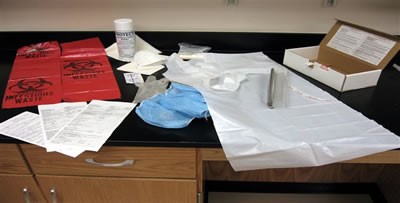After providing care to an individual during an incident, it is critical to promptly and properly clean the affected area to eliminate the risk of exposure to bloodborne pathogens. Blood and body fluids may pose a health risk until all contaminated surfaces and materials are thoroughly disinfected or safely disposed of. Cleanup must only be performed by designated and trained personnel. Contact your supervisor or resident advisor to identify the designated responder for your area.
Cleaning Blood and Body Fluids

Safe Housekeeping
Whenever you clean up blood or body fluids:
- When cleaning up blood or other potentially infectious materials (OPIM), follow these safety protocols:
- Restrict access to the affected area to prevent additional exposure.
- Wear gloves (latex or nitrile) to protect your hands. Take care to avoid punctures or tears. Replace any damaged gloves immediately.
- Use additional personal protective equipment (PPE) as needed, such as a leak-proof apron and/or eye protection, based on the level of exposure.
- Absorb bodily fluids with disposable towels or absorbent materials.
- Clean the area with an appropriate disinfectant solution—typically one part household bleach to ten parts water. This solution is effective against HIV and hepatitis B.
- Disinfect all cleaning tools (e.g., mops, buckets) immediately after use to prevent cross-contamination.
- Dispose of all contaminated materials (towels, gloves, etc.) in a red biohazard bag or another sealed, labeled (with a biohazard symbol), and leak-proof container. This is considered regulated waste.
- Contact UK Environmental Management at 859-323-6280 to request pickup and disposal of regulated waste.
Be Prepared: Safety Best Practices
- Always wear gloves when there is a potential for exposure to blood or body fluids.
- Be vigilant for sharps such as broken glass or used needles when handling or emptying trash.
- Never pick up broken glass with your hands—use a brush and dustpan.
- Thoroughly wash your hands and remove all PPE before eating, drinking, smoking, applying cosmetics or lip balm, or handling contact lenses.